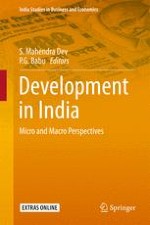2016 | OriginalPaper | Buchkapitel
13. Finite Change—Implication for Trade Theory, Policy and Development
verfasst von : Sugata Marjit, Biswajit Mandal
Erschienen in: Development in India
Verlag: Springer India
Aktivieren Sie unsere intelligente Suche, um passende Fachinhalte oder Patente zu finden.
Wählen Sie Textabschnitte aus um mit Künstlicher Intelligenz passenden Patente zu finden. powered by
Markieren Sie Textabschnitte, um KI-gestützt weitere passende Inhalte zu finden. powered by
